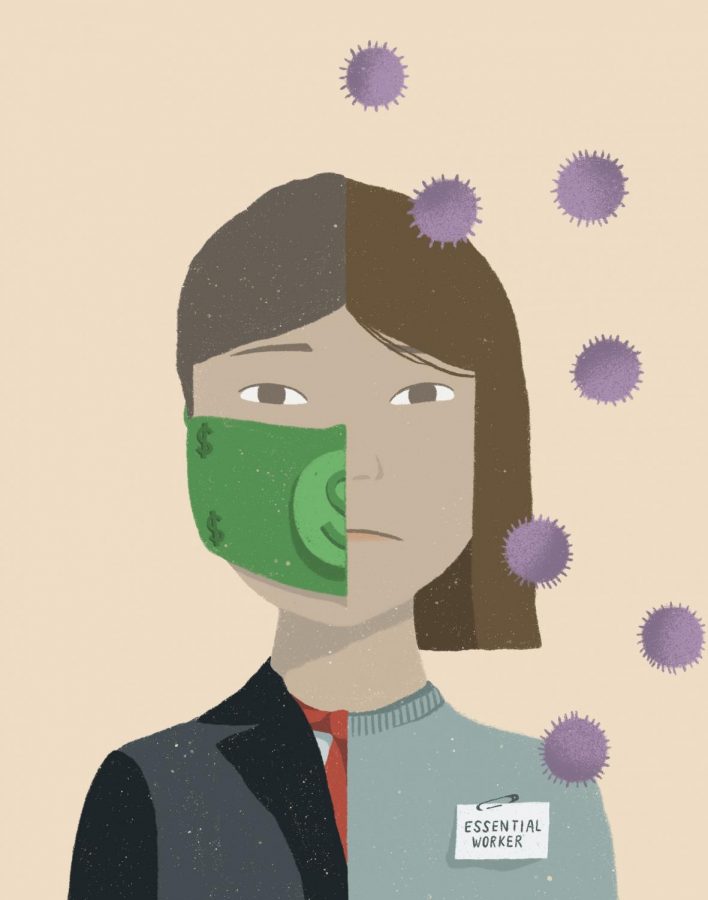COVID-19 tears back the curtain on socioeconomic inequality
May 26, 2020
Wealth inequality has been woven into the fabric of American society since the earliest days of the republic. For every esteemed 18th-century statesman, a thousand plantation workers toiled, stricken with disease. For every 19th-century railroad tycoon, millions of factory workers labored in callous conditions for sixteen hours a day, in exchange for the lowest of wages. And for every modern-day Wall Street titan, tens of millions of American families struggle to pay their bills at the end of the month.
From the outset of the COVID-19 pandemic, this perpetual cycle of wealth inequality quickly morphed into a flood of unemployment and debt that has left minority and low-income Americans unable to financially support themselves.
Even prior to the coronavirus outbreak, the income gap between upper and middle class Americans was at a record high. A study conducted by UC Berkeley Professor Emmanuel Saez revealed that the top 0.1% of earners took home salaries 196 times as much as those of the bottom 90%. Furthermore, a report by the National Bureau of Economic Research found that the wealthiest 5% of Americans hold 66% of the nation’s wealth.
These disparities in wealth and income have had disastrous impacts on millions of Americans. And amidst the current pandemic, the negative effects of wealth inequality have been laid bare and amplified in an unprecedented fashion.
Many Americans already live paycheck-to-paycheck. A report released by the Federal Reserve states that when faced with an unexpected $400 expense, 4 in 10 Americans would not be able to pay it without taking on debt.
With the closing of “non-essential” businesses, unemployment has skyrocketed and low-income Americans are among the most impacted. The millions of Americans who were already paying their expenses on extremely tight margins have suddenly been stripped of their incomes, leaving them severely debt-burdened.
According to the Economic Well-Being of US Households report, 40% of workers with an income under $40,000 were laid off in March alone.
As the virus continues to upend lives and the need for “essential” workers grows, many of these unemployed Americans have no choice but to take up jobs such as grocery-store workers, cashiers, and other essential occupations. This leaves them extremely vulnerable to contracting the virus and transmitting it to others in their community, thereby exacerbating its spread.
Data released by the Boston Public Health Commission reveals that the neighborhoods impacted the most by the virus also had the highest proportions of essential workers.
Compounding these health risks is the inaccessibility of personal protective equipment (PPE) such as masks, gloves, and other means of preventing virus transmission. If masks are not completely sold out, their prices are gouged far out of reach of the average consumer, much less low-income Americans.
According to a report by the United States Private Interest Research Group, the prices of surgical masks on Amazon were up 166% higher than average in March.
Moreover, one in five low-wage workers are not provided with benefits such as paid leave or health insurance. Even those who are provided with health coverage are susceptible to losing it if they lose their jobs.
With a lack of health insurance comes a fear of high medical bills. Generally, that means uninsured patients try to avoid the hospital as much as possible to prevent paying out of pocket. In fact, a study by the NCBI found that up to 13% of uninsured Americans delayed or denied medical treatment because of cost. This statistic is markedly dangerous during the pandemic because neglecting treatment now could make potential transmission much more likely.
The deck is stacked against many, but the situation is especially dire for two marginalized groups: racial minorities and women.
African Americans and Hispanics are overrepresented in low paying industries such as restaurants and taxi driving, both of which have seen demand fall off a cliff. Similarly, women make up 66% of the 23.8 million workers in the lowest paying jobs in America. These jobs include cashiers, waitresses, and hotel housekeepers, all occupations which are facing heavy layoffs.
Consequently, minorities in particular have been disproportionately contracting the virus as they attempt to find alternate employment and are left most vulnerable.
Socioeconomic inequality based upon race and gender is clearly being worsened at the hands of the pandemic. Unfortunately, by digging a deeper hole for communities that are already marginalized in society, we are creating years – even generations – of barriers to be overcome.
Despite this, efforts are certainly being made to reduce wealth inequality. Over the years, state and local governments have been making incremental policy changes in an effort to ameliorate the financial situations of low-income Americans. States have increased minimum wage, raised income taxes on high earners and invested in education to provide opportunities for students in low-income communities. And just a few months ago, Congress passed a monumental $2 trillion stimulus bill aimed at helping businesses, hospitals and low-income individuals stay fiscally solvent during the pandemic.
Still, upward social mobility for minority and low-income Americans remains a challenge.
A study conducted by the Economic Mobility Project found that 65% of Americans born into the bottom 20% in terms of wealth stay there. Until the federal government takes unilateral, bipartisan action to reduce the wealth gap, the situation for low-income Americans will only get worse.
Even with the government’s current attempts to assist low-income Americans during the pandemic, there are still internal problems. For example, the stimulus bill, which includes $1,200 checks for every adult American earning $75,000 or less, relies on tax returns from the past two years. However, there is a significant number of low-income, disabled and/or elderly Americans who have not filed tax returns in the past two years, which makes it harder for them to access the relief that is meant specifically for them.
For many, it is all too easy to be consumed by cynicism during this global crisis. However, it is important to realize that as a collective society, we are all responsible for the prosperity of one another. Shifts in culture will be required to stop the systemic racism and sexism that is contributing to the current economic turmoil.
Change will not be immediate, but understanding how we got here and being conscious of the hardships others are going through is a step in the right direction.



